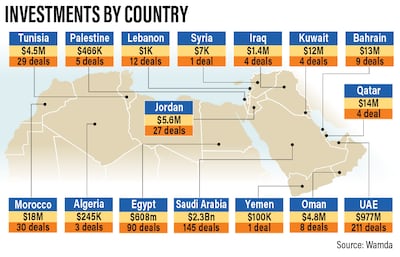Saudi Arabia is expected to become a leading market for start-up exits in the Mena region, as its ecosystem continues to mature, with mergers and acquisitions, as well as initial public offerings, on the rise.
The UAE has historically topped the list, accounting for about 60 per cent of all exits in the region. But the kingdom is catching up, despite its venture market only being active in the past five years, giving venture capitalists more opportunities to get a return on their investments, analysts say.
In the first half of this year, Saudi Arabia's share of exits rose to 20 per cent, compared with 12 per cent in 2021, says Philip Bahoshy, chief executive of data platform Magnitt. Last year, the kingdom witnessed a total of nine exits, accounting for 21 per cent of the Mena region's M&A transactions and ranking second after the UAE. Start-ups usually take an average of seven years to exit, he adds.
"You are seeing more share of exits taking place in Saudi Arabia, but because Saudi’s venture has really only been active for about five years, many companies in Saudi have not hit the window for exits, relative to the rest of the Mena region," he says. "We are waiting and anticipating for exits to continue to rise in the next two to three years."
Some of the most notable exits in the kingdom include Tabby’s recent acquisition of Tweeq for an undisclosed amount, and Riyadh-based FinTech start-up Rasan, which raised $224 million from its initial public offering on the Tadawul exchange in June. Online food delivery start-up Jahez also listed on Saudi Arabia's secondary market, Nomu, in 2022, giving it a market valuation of $2.4 billion at the time.
While M&As are usually the most common exit route, Khaled Talhouni, managing partner at Nuwa Capital, expects the kingdom’s IPO space to become an increasingly viable path for start-up exits in the region.
“The key exit opportunity emanating from Saudi Arabia is the IPO route," he says. "Tadawul, and to some extent Nomu, are viable paths towards an IPO for regional tech companies. This has been made possible by the relatively recent uptick of activity on those exchanges.
"The recent public offerings of Rasan and Jahez illustrate this point and I wouldn’t be surprised if a number of new public offerings in Saudi Arabia, as well as in the UAE, are in process."
More than 13 Saudi start-ups are preparing to go public in the next two years, in large part because of the financial support they are receiving to grow their ventures, Saudi Venture Capital told media outlet Asharq News this year.

Saudi Arabia, the Arab world's largest economy, emerged as the region's most-funded country for start-ups last year. Start-ups in the kingdom raised $1.3 billion through venture capital funding, overtaking the UAE for the first time as the top destination for VC investment in the Mena region, Magnitt says. In the first half of this year, Saudi start-ups raised more than $400 million in capital, again the highest in the region, the data platform adds.
As part of Saudi Arabia’s economic diversification agenda under Vision 2030, start-ups are receiving significant support from local funds such as STV, a technology VC fund with $800 million in capital, and Sanabil, a portfolio company of the kingdom’s sovereign wealth fund, the Public Investment Fund.
Last year, STV announced a $150 million fund to accelerate the growth of technology companies in Saudi Arabia and across the region. Meanwhile, Sanabil has committed $2 billion in capital a year for private investments that support VC growth.
Eyad Albayouk, general manager of Flat6Labs in Saudi Arabia, believes the kingdom's large market, coupled with ample capital, is fuelling the growth of the venture space.
“I think it's an opportune time for a lot of people to consider liquidity events within the Saudi market. We have a few tailwinds that are helping make this happen, he says. "But the biggest tailwind, I think, is just the sheer market size, especially within the Mena context. And it definitely does have the depth in terms of financial capital to offer, whether strategic or even financial acquisition capital, for such events."
Besides liquidity, the kingdom’s updated regulations, the growing number of incubators and accelerators and the establishment of tax-free zones are all factors contributing to a maturing ecosystem, Mr Albayouk says.

“Five years ago, the exit via an IPO path was a pipe dream," he adds. "It wasn’t a consideration for those that weren’t large corporations. Today, definitely that’s very different with the ease of listings for both SMB-type businesses on the parallel market and also on the main market with larger or more mature businesses."
Mr Bahoshy says that, with start-ups in the kingdom receiving significant funding, looking for expansion opportunities inside and outside the region, and regulators focusing on tech companies that have the potential to announce IPOs, the market could become attractive for companies looking to exit. “Unlike many other jurisdictions, you have all three of those elements that are likely to benefit the exit environment for companies in Saudi,” he adds.
